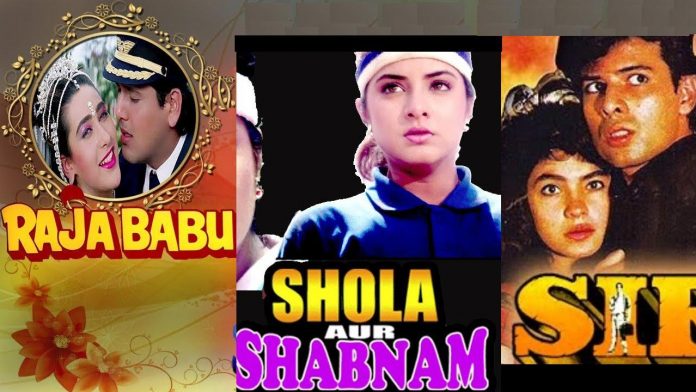(From our issue dated 25th February, 1995)
Satellite television viewers in Bihar recently saw Shola Aur Shabnam, Raja Babu, Sir and other latest films on TV. They were telecast by Nepal TV which is beamed in Bihar in India as well as some countries abroad.
The film industry has termed as an unfair trade practice Nepal TV’s forays into India.
FMC, FDC REAFFIRM FAITH IN
STAR-CEILING SCHEME
Following the resignations of a number of producers from the IMPPA last week over the issue of star-ceiling, the FMC and the FDC have resolved to strictly implement their joint resolution in respect of the ceiling on star assignments.
At a joint meeting of the Film Makers Combine and the Film Distributors Council held in Delhi on 23rd February under the chairmanship of Prabhat Bhushan, the following three resolutions were passed:
(1) That the agreement dated 10th June, 1994 entered into between FDC and FMC will be strictly adhered to and implemented by both parties.
The June ’94 agreement provides for a 2-week delay in the release of video cassettes of films from the date of premiere theatrical release, 6-month delay in telecast through cable TV, and 5-year delay in the telecast on DD and satellite channels.
(2) That the resolution in respect of restriction on assignments of cine artistes will be, as agreed, strictly implemented jointly by FMC and FDC. Persons who will violate or infringe, directly or indirectly, the said resolution will be sternly dealt with by FMC and FDC. The spirit and purpose of the said resolution is reaffirmed and the FMC and FDC will implement the same effectively. It is agreed to circulate for information of the producers and distributors that no picture will be registered by any Association affiliated to FDC unless the same is cleared in writing by FMC.
(3) That the committee also discussed about further measures to be taken against the violation of the said resolution and also against those who are directly and/or indirectly associated with those persons. The committee also decided to meet in Bombay on 1st March, 1995 to discuss and finalise further line of action, to maintain unity and discipline.
MUKESH BHATT WITHDRAWS RESIGNATION
While some more producers have resigned from the IMPPA in addition to the 45 who had resigned last week, at least one producer, Mukesh Bhatt, has withdrawn his resignation and rejoined the IMPPA.
It may be recalled that the resignations of producers from the IMPPA started last week following their dissatisfaction over the working of the present executive committee in general and the continuance of the star-ceiling scheme in particular.
KANNADA FILM PRODUCERS TO
STAGE DEMONSTRATION
The Kannada Film Producers’ Association will hold a demonstration in Bangalore today (25th February) to seek a control on release of language films other than those in Kannada in the state of Karnataka with a view to promote Kannada films. The Association has demanded that the films of other languages be screened in Karnataka only after 100 days of their run in the respective states.
In a press statement, Association president C.V.L. Shastri said that there was no demand for Kannada films in other states, and Karnataka was their only market, but other language films were in high demand in Karnataka also, thereby cutting into the Kannada film market.
In the meantime, leaders of Kanna Chaluvali have decided not to allow non-Kannada films to be released in Karnataka from 1st May if other states did not screen Kannada films.
PEOPLE
Are talking about
** The fantastic price for which Time’s Sabse Bada Khiladi has been sold for Bombay. The deal has been struck separately for Bombay city-suburbs, Maharashtra and Karnataka (Dilip Dhanwani of Dilsa Distributors) and Gujarat-Saurashtra (Suresh Vora). The Thane sub-territory has already been sold by Dilip, again for a phenomenal price.
** The extraordinary price paid by Bharatbhai Shah (VIP Enterprises) for the Bombay distribution rights of the Hindi dubbed version of the Tamil blockbuster Kadhlan.
PEOPLE
Are surprised
** That as many as six films are slated for release on Idd (3rd March) while there’s no film scheduled for release the following week (10th March). The Idd advantage will be offset by the disadvantage of oppositions, at least in the case of smaller films.
PEOPLE
Are waiting for
** Mani Ratnam’s Bombay to be released. After being held up at the censors for about two months, the film will be cleared soon now. It should be released next month. In the meantime, its music is growing in popularity day by day and is a rage today.
** The outcome of the assembly election results and the consequent opinion on TADA, which will decide whether or not Sanjay Dutt will be freed on bail soon.
PEOPLE
Are in the dark about
** A.R. Rahman’s style of working, about his price, about his music sittings and about the time he takes for composing songs.
You Asked It
While Bombay cinemas are downing shutters, foreign companies are planning to build new cinemas in Bombay. Why is it so?
– The foreign companies are planning to build not just cinemas but multiplexes, which will house 4 to 6 cinemas in one premise, besides restaurants and other recreational facilities. Besides, the new cinemas will be mini cinemas with the latest sound system.
Will the ever-increasing film prices (ratios) never come down?
– Not so long as there are gamblers in the distribution trade, who are willing to pay fancy prices.
Why are other regional language film industries not flourishing as the South language industries?
– In the South, filmmaking is treated like an art and business, while in other regions, the standard of filmmaking, generally speaking, is low.
If a producer does not sell the Overseas and India video rights of his film at all, would his distributors increase their prices by 20%?
– It all depends on the film in question. If the film is big with a good star cast and is carrying good reports and seems to be a potential hit, distributors wouldn’t mind paying 10 to 15% more.
WEDDING BELLS
Marriage of Sandeep, son of Daleep Khanna and nephew of Vinod Khanna and Satish Khanna of Kanpur, with Ruby will be solemnised on 26th February in Chandigarh. A reception to celebrate the marriage will be held on 28th in Kanpur.
SONALI HURT IN FREAK ACCIDENT
Sonali Bendre had a miraculous escape in a freak accident on the sets of Raj Kumar Kohli’s Jeene Nahi Doonga at Chandivali Studios on 21st February. While participating in a chase scene where the villain’s jeep was following Arman Kohli and Sonali, the latter fell down and was run over by the jeep. Luckily for Sonali, she escaped safe. Her head, chin and cheek were, however, injured.
‘HUKUMNAAMA’ DELIVERY
Soubhagya Films, Secunderabad, the Nizam distributors of Hukumnaama, have initiated legal proceedings against its producers for not giving them the film’s delivery. The distributors have alleged that the producers have defrauded them. According to them, they had scheduled the film’s release on 17th February in Nizam and had also deposited the raw stock for two prints, with the laboratory.
FILM EDITOR WAMANRAO DEAD
Well-known film editor Wamanrao Mengle passed away in a private hospital at Dahisar, Bombay on 20th February after a brief illness. He was 62 and is survived by his wife, two daughters and five sons. His funeral was held the same day.
Wamanrao had edited a number of films including Noor Jehan, Victoria No. 203, Don, Damaad, Chori Mera Kaam, Aansoo Ban Gaye Phool, Adhikar, Anubhav, Dus Lakh, Jhansi Ki Rani, Sau Din Saas Ke etc. Wamanrao used to be the regular editor of all films produced under the banner of Goel Cine Corporation till Dus Lakh.
He had completed the editing of the Marathi film Premachya Sultya Bomba before he passed away.
BAHAR, BOMBAY DOWNS SHUTTERS
Bahar Cinema at Vile Parle, Bombay, closed down for good on 24th February. Just two weeks back, another cinema — Bandra Talkies — in the western suburb of Bombay downed shutters.
COVER VERSIONS: T-SERIES WINS
CASE IN DELHI HC
The Delhi high court has ruled that Super Cassettes Industries (T-Series) can continue to come out with version recordings so long as they change the manner of presentation of the inlay cards. The court held that the audio cassettes of Hum Aapke Hain Koun..!, which T-Series was producing as version recordings, were not infringing copies.
The Gramophone Co. of India Ltd. (HMV), which is marketing the original cassettes of HAHK..!, had gone to court seeking a ban on the cassettes of T-Series. The court allowed T-Series to sell their cover version cassettes provided they sufficiently distinguished their products from those of HMV through a declaration.
It was also held by the court that Super Cassettes shall give notice of intention and payment of royalty to HMV and not to Rajshri Productions P. Ltd. since it was HMV which was prima facie shown to be the owner of the copyright.
Kapil Sibal, assisted by Pravin Anand and advocate N.K. Bhardwaj, appeared for Super Cassettes. Arun Jaitley and Lal appeared for HMV.
Raj Kanwar Turns Producer, Launches ‘Itihaas’
Director Raj Kanwar turned producer with the launching of Inderjit Films Combine’s Itihaas with a song recording on Feb. 24 at Sahara India. The song was penned by Sameer and rendered by Alka Yagnik and chorus under the baton of music directors Dilip Sen Sameer Sen.
The film stars Ajay Devgan, Twinkle Khanna, Aroona Irani, Shakti Kapoor, Amrish Puri and Raj Babbar. It is being produced and directed by Raj Kanwar and is based on a screenplay by Robin Bhatt and Akash Khurana. It has dialogues by Kamlesh Pandey, cinematography by Harmeet Singh, art by R. Verman and editing by A. Muthu.
3-E
Education-Entertainment-Enlightenment
And Now, DTS Digital Sound
After Dolby and Ultra Stereophonic sound, what? DTS digital sound. DTS digital sound system is a product of Digital Theater Systems, California. It is a 6-track digital system designed to produce the best sound replication possible in a cinema hall. The system was launched on June 11,1993 with the release of Steven Spielberg’s Jurassic Park. Since then, the number of DTS installations all over the world has grown to 3,000. So far, nine major studios and producers, including MGM, Paramount, Universal, Warner Bros., 20th Century Fox, Amblin Entertainment, Miramax, Castle Rock Pictures and New Line Cinema, have released about 80 films in the DTS format.
In India, Prem will be the first film to be released in the DTS format. Two technicians will be flying from California specially for the DTS mixing of Prem in Madras next month. According to Boney Kapoor, DTS differs from other sound systems in that its digital sound-track is not contained on the film itself but on separate CD-ROM discs. The six tracks of digital audio data that are stored on the CD-ROM disc are read by the DTS-6 Playback Unit. The DTS-6 is a reasonably priced sound system and is compatible with the Ultra/Dolby sound systems. It is being promoted in India by Real Image Pvt. Ltd., Madras.
Here’s what the great Steven Spielberg, who, incidentally, is a partner in Digital Theater Systems, has to say about the DTS-6 sound system:
“Since the introduction of DTS, I have spoken to many sound mixers, producers, directors and studio executives who are all in agreement that DTS provides the finest sound reproduction possible. I firmly believe that the range of sound that this digital system provides on 35mm print gives us the same highs and lows that were previously only available on 70mm print. The feedback I have received firsthand from motion picture exhibitors has also been very positive. From their standpoint, the ease of system operation, technical support provided, the number and calibre of films released in DTS, and the very affordable price of a system, all make DTS the overwhelmingly popular choice. DTS truly has revolutionised motion picture sound reproduction, and I can’t imagine a filmmaker or exhibitor not wanting to take advantage of the newest and best technology available.”
Sachin’s Innings
Sachin Bhaumick, the prolific script-writer of many a hit film, has been around for as many as 34 years. And he continues writing scripts after scripts with a secret mission, or rather passion — to make it to the Guinness Book of World Records.
His first film was Hrishikesh Mukherjee’s Anuradha which, released in 1961, won the President’s gold medal. This film made it to the Berlin film festival, and Sachin-Da had the honour of visiting the festival as a delegate. Till now, Sachin-Da has written more than 140 films, including the latest blockbuster, Karan Arjun. More than 100 films have been successes, including Jugnu (75 weeks), Aradhana (100 weeks) and Hum Kisise Kum Nahin (50 weeks). Perhaps, no other Hindi film writer, living or dead, can boast of such a track record. His ready-for-release films include Saajan Ki Bahon Mein, Kanyadaan and Bewafa Sanam. On the sets are Sujit Kumar’s Daraar, Gava’s Karobaar and Pitrachhaya Productions’ Karam Bandhan. Ready to go on the sets are, among others, B.R. Chopra’s two films, Yash Chopra’s two, and the new films of Venus, Sanjay Roy, Rakesh Roshan (Koyla). He is also scripting TV serials of B.R. Chopra (Kanoon), Hrishikesh Mukherjee (Agar Aisa Hota), Yash Chopra (Karm) and Romesh Sharma (Usool). He is also writing B.R. Chopra’s next serial, Bada Aadmi. If the Indian cricket team has a prolific Sachin Tendulkar, the Hindi film industry has its own Sachin — Sachin Bhaumick.
Cinema Shortage
If more cinemas in Bombay close down at the rate at which they are downing shutters now, the shortage of cinemas is soon going to be felt rather acutely. Bandra Talkies closed down two weeks back, followed by Bahar Talkies this week. It is rumoured that three more cinemas — two in the Western suburbs and one in the Central suburbs — will soon be demolished. Reportedly, the properties of the three cinemas have been sold to a common party.
Diverse Experiments
While the Barjatyas are yet to release the video cassettes of Hum Aapke Hain Koun..!, few may remember that the same Barjatyas had released the video cassettes of Maine Pyar Kiya one day before its theatrical release. That is to say, while the film was released theatrically on 28th December, 1989, its video cassettes were out a day earlier, on 27th December. Like the experiment about delayed release of video cassettes with HAHK..!, the early release of MPK cassettes was also an experiment. Since MPK was the first Indian film in 4-track Stereophonic sound, the Barjatyas were confident that the public would like to see the film in the theatres to enjoy the sound. They, therefore, felt that its video cassettes would serve as the film’s trailer and hence the simultaneous (or rather, early) release.
































